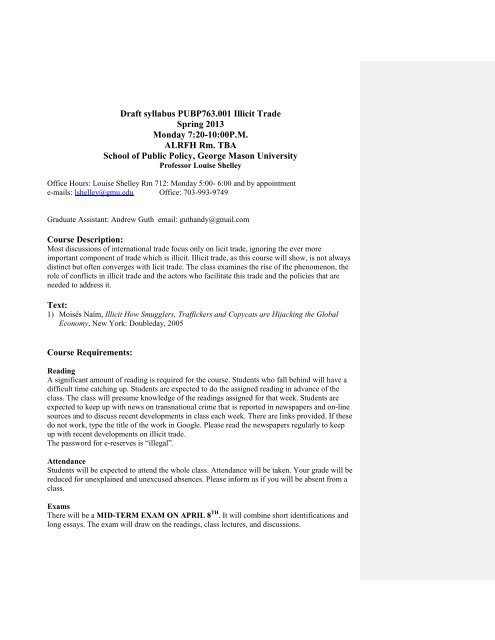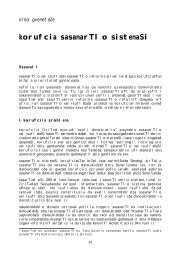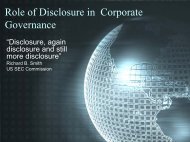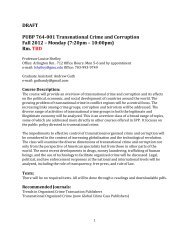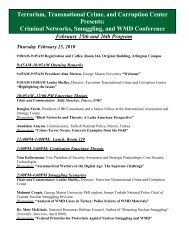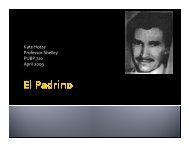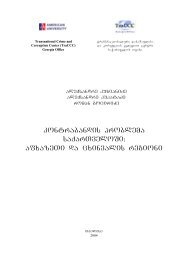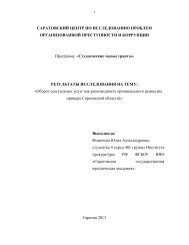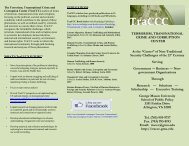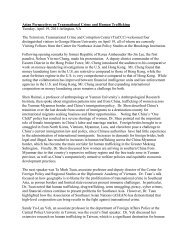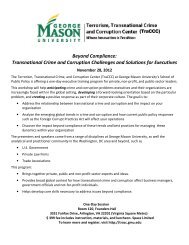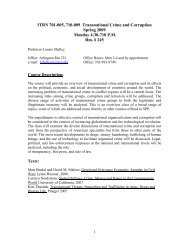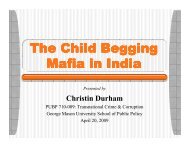Syllabus - Terrorism, Transnational Crime and Corruption Center
Syllabus - Terrorism, Transnational Crime and Corruption Center
Syllabus - Terrorism, Transnational Crime and Corruption Center
Create successful ePaper yourself
Turn your PDF publications into a flip-book with our unique Google optimized e-Paper software.
Draft syllabus PUBP763.001 Illicit Trade<br />
Spring 2013<br />
Monday 7:20-10:00P.M.<br />
ALRFH Rm. TBA<br />
School of Public Policy, George Mason University<br />
Professor Louise Shelley<br />
Office Hours: Louise Shelley Rm 712: Monday 5:00- 6:00 <strong>and</strong> by appointment<br />
e-mails: lshelley@gmu.edu Office: 703-993-9749<br />
Graduate Assistant: Andrew Guth email: guth<strong>and</strong>y@gmail.com<br />
Course Description:<br />
Most discussions of international trade focus only on licit trade, ignoring the ever more<br />
important component of trade which is illicit. Illicit trade, as this course will show, is not always<br />
distinct but often converges with licit trade. The class examines the rise of the phenomenon, the<br />
role of conflicts in illicit trade <strong>and</strong> the actors who facilitate this trade <strong>and</strong> the policies that are<br />
needed to address it.<br />
Text:<br />
1) Moisés Naím, Illicit How Smugglers, Traffickers <strong>and</strong> Copycats are Hijacking the Global<br />
Economy, New York: Doubleday, 2005<br />
Course Requirements:<br />
Reading<br />
A significant amount of reading is required for the course. Students who fall behind will have a<br />
difficult time catching up. Students are expected to do the assigned reading in advance of the<br />
class. The class will presume knowledge of the readings assigned for that week. Students are<br />
expected to keep up with news on transnational crime that is reported in newspapers <strong>and</strong> on-line<br />
sources <strong>and</strong> to discuss recent developments in class each week. There are links provided. If these<br />
do not work, type the title of the work in Google. Please read the newspapers regularly to keep<br />
up with recent developments on illicit trade.<br />
The password for e-reserves is “illegal”.<br />
Attendance<br />
Students will be expected to attend the whole class. Attendance will be taken. Your grade will be<br />
reduced for unexplained <strong>and</strong> unexcused absences. Please inform us if you will be absent from a<br />
class.<br />
Exams<br />
There will be a MID-TERM EXAM ON APRIL 8 TH . It will combine short identifications <strong>and</strong><br />
long essays. The exam will draw on the readings, class lectures, <strong>and</strong> discussions.
Class Project 20%: Written <strong>and</strong> Oral Presentations. Presentations will be chosen by the student in<br />
coordination with the instructor. CLASS PRESENTATIONS BEGIN FEB 18th.<br />
The class presentations should map the route of an illicit commodity or multiple commodities<br />
through a particular area. We want to explain the route of the commodity, its transition over time<br />
<strong>and</strong> those who facilitate the illicit trade. A 2-3 page double spaced concise analysis should<br />
accompany the powerpoint that will make the illicit trade underst<strong>and</strong>able to those who are not<br />
specialists in the illegal side of the global economy. A bibliography should be attached. Possible<br />
examples might be: Smuggling in the Tri-border area of Latin America, drug smuggling in<br />
Pakistan <strong>and</strong> Afghanistan, the Balkan smuggling route <strong>and</strong> what is smuggled along it.<br />
TERM PAPER DUE MAY 12 TH : length 20-25 pages, st<strong>and</strong>ard reference format<br />
The topic will be chosen after consultation with the instructor. It can use insights that are<br />
obtained from the oral presentation. It should discuss a topic related to illicit trade <strong>and</strong> should<br />
develop a bibliography of diverse sources. Examples of suitable topics are: illicit trade in<br />
antiquities, illicit trade in CFCs or illicit trade in counterfeit cds. You can choose to focus on a<br />
particular area of illicit activity, a region of the world where this trade goes or a strategy or set of<br />
strategies that can be used to address the problem.<br />
Grading:<br />
Students will be graded according to the following criteria:<br />
Class attendance <strong>and</strong> participation 20%<br />
Class Project 20%<br />
Mid-Term Exam 25%<br />
Term Paper 35%<br />
Plagiarism:<br />
Plagiarism is representing or submitting someone else's language or ideas as your own.<br />
Plagiarism is strictly prohibited by the University <strong>and</strong> will lead to disciplinary action.<br />
You must write your own papers. Identify, with quotation marks <strong>and</strong> footnotes, direct quotations<br />
from others. Identify, with footnotes or attribution in the text of your writing, ideas of others that<br />
you have paraphrased.<br />
Weekly Schedule:<br />
January 28 Week 1 Introduction to the Course<br />
February 4 Week 2 Illicit Trade in Historical Perspective?Why the Growth of Illicit<br />
Trade?<br />
Read: 1) Itty Abraham <strong>and</strong> Willem van Schendel, Illicit Flows <strong>and</strong> Criminal Things, Chapter 1<br />
Spaces of Engagement,pp. 38-62
2) Naím, Illicit, pp. 1-37.<br />
3) World Economic Forum: Global Risks 2011, pp. 22-25, 36-39<br />
http://riskreport.weforum.org/global-risks-2011.pdf<br />
4) Karras, Smuggling, pp. 1-18<br />
February 11 Week 3 Illicit Financial Flows <strong>and</strong> their Impact on Development<br />
Read: 1) Global Witness, Undue Diligence How Banks do Business with Corrupt Regimes<br />
March 2009, pp. 3-39, 105-110<br />
http://www.globalwitness.org/sites/default/files/pdfs/undue_diligence_lowres_0.pdf<br />
2) Liana Sun Wyler <strong>and</strong> Dick.K, Nanto, “North Korea <strong>Crime</strong>-for-Profit Activities”<br />
August 25, 2008, Summary, pp.1-4. http://www.fas.org/sgp/crs/row/RL33885.pdf<br />
3) Carolyn Nordstrom, ch. 15 “The Cultures of Cops”, Global Outlaws: <strong>Crime</strong>, Money<br />
<strong>and</strong> Power in the Contemporary World Berkeley: University of California Press,<br />
2007, pp. 149-55 (e-reserves).<br />
Global Financial Integrity<br />
4) Global Financial Integrity Report 2011, “Illicit Financial Flows from<br />
Developing Countries: 2000-2009, pp. vii-1, 9-32,<br />
http://www.gfip.org/storage/gfip/documents/reports/IFF2010/gfi_iff_update_reportweb.pdf<br />
Comment [LS1]: See report on China, see next one<br />
February 18 Week 4 Illicit Trade <strong>and</strong> Conflict Regions<br />
Presentations Begin this Week<br />
Comment [LS2]: Update this section<br />
Read: 1) V<strong>and</strong>a Felbab-Brown, ch. 11:From Sanctuaries to Protostates.” Denial of<br />
Sanctuary: underst<strong>and</strong>ing terrorist safe havens” edited by Michael A. Innes; Westport,<br />
Conn: Praeger Security International, 2007, pp.152-66 (see e-reserves)<br />
2) William Reno, “Illicit Commerce in Peripheral States” in <strong>Crime</strong> <strong>and</strong> the global<br />
political economy ed. By H. Richard Friman Boulder:Lynne Rienner, 2009, pp.67-84<br />
(e-reserves)<br />
3) Global Witness , Undue Diligence: How Banks do Business with Corrupt Regimes,<br />
March 2009, pp.68-82 (Citibank, Fortis <strong>and</strong> Liberia’s logs of war)<br />
http://www.globalwitness.org/sites/default/files/pdfs/undue_diligence_lowres_0.pdf<br />
4) Global Witness, Faced with A Gun What can you do? , pp.1-14, 25-37.<br />
http://www.globalwitness.org/sites/default/files/pdfs/report_en_final_0.pdf<br />
5) See website of Global Witness http://www.globalwitness.org/<br />
6) United Nations Office on Drugs <strong>and</strong> <strong>Crime</strong> (UNODC) Drug Report 2010.<br />
www.unodc.org/documents/...2010/World_Drug_Report_2010_lo-res.pdf, pp. 231-245<br />
Feb. 25 Week 5 Illicit Arms Trade <strong>and</strong> Nuclear Smuggling<br />
Naim 38-64<br />
Efrat—<br />
Shelley<br />
Comment [LS3]: Add on arms trade <strong>and</strong> bout
March 4 Week 6 Illicit Trade in Natural Resources<br />
Read: 1) Naím, Illicit, pp.157-74.<br />
2) Add OECD report.<br />
3) Pervaze A. Sheikh, “Illegal Logging: Background <strong>and</strong> Issues”, June 9, 2008,<br />
Congressional Research Services,<br />
http://ncseonline.org/NLE/CRSreports/08July/RL33932.pdf<br />
4) Liana Sun Wyler <strong>and</strong> Pervaze A. Sheikh, International Illegal Trade in Wildlife:<br />
Threats <strong>and</strong> U.S. Policy,” 2008. pp.1-40 (concentrate on the first half <strong>and</strong> look at<br />
policy suggestions) http://fpc.state.gov/documents/organization/110404.pdf<br />
5) GTZ, “<strong>Corruption</strong> in the Forestry Sector <strong>and</strong> Illegal Logging”,<br />
http://www2.gtz.de/dokumente/bib/gtz2009-0238en-policy-briefs-corruption.pdf<br />
6) Carolyn Nordstrom,Ch.11 Diamonds <strong>and</strong> Fish” in Global Outlaws: <strong>Crime</strong>, Money <strong>and</strong><br />
Power in the Contemporary World Berkeley: University of California Press, 2007,<br />
pp.105-113 (e-reserves)<br />
7) Global Witness <strong>and</strong> Environmental Investigation Agency, “Investigation into the<br />
Global Trade in Malagasy Precious woods: Rosewood, Ebony <strong>and</strong> Pallis<strong>and</strong>er,”<br />
October 2010, pp.4-6 <strong>and</strong> 10. http://www.financialtaskforce.org/wpcontent/uploads/2010/10/Illegal_Timber_Report_261010.pdf<br />
8) Look at website of Traffic http://www.traffic.org<br />
Comment [LS4]: Add material from OECD, add<br />
videos<br />
March 11 Spring Break<br />
March 18 Week 7 Trade in Humans, Illegal Migration<br />
Comment [LS5]: Add new material<br />
Read: 1) Naím, Illicit, pp.86-108<br />
2) add TIP report2012 pp.<br />
3) Shelley, Human Trafficking - Chapters 3-4, pp. 83-114 (e-reserve)<br />
4) TVPA Act—pp.388-393 2012 TIP Report (relevant organizations <strong>and</strong> documents)<br />
add on labor migration policy<br />
March 25 <strong>and</strong> April 1 Weeks 8 <strong>and</strong> 9 Drugs<br />
Read: 1) Naím, Illicit, pp.65-86.<br />
2) Abraham, ch. 4, pp.128-152<br />
3) Paul Gootenberg, Ch. 6 Birth of the Narcos, in Andean Cocaine: The Making of a<br />
Global Drug Chapel Hill:University of North Carolina Press, pp.245-289 (E-reserves)<br />
4) Stephen E. Flynn, ch.7 “The Global Drug Trade vs. The Nation State: Why the Thugs<br />
Keep Winning” in Beyond Sovereignty: Issues for a Global Agenda ed. Mary<br />
Cusimano Love Belmont:Calif:Thomson/Wadsworth, 2007, pp.161-185. (e-reserves)<br />
Add from stori <strong>and</strong> De Grauwe book (reuter or other chapter?)<br />
Chapter from Illicit Trade <strong>and</strong> the Global economy<br />
Comment [LS6]: Add new material
5) United Nations Office on Drugs <strong>and</strong> <strong>Crime</strong> (UNODC) Drug Report 2010.<br />
www.unodc.org/documents/...2010/World_Drug_Report_2010_lo-res.pdf, pp. 11-27<br />
6) Edwina A. Thompson Trust is the Coin of the Realm, Lessons from the Money Men in<br />
Afghanistan, pp.217-238.<br />
April 8 Week 10 MIDTERM EXAM<br />
April 15 Week 11 Intellectual Property <strong>Crime</strong>, Counterfeiting <strong>and</strong> Diversion<br />
Read: 1) Naím, Illicit, pp. 109-130<br />
2) Gregory Treverton et.al. Film Piracy, Organized <strong>Crime</strong> <strong>and</strong> <strong>Terrorism</strong>, R<strong>and</strong> Publication,<br />
2009 (e-reserves)<br />
3) Efrat, Governing Guns an, Preventing Plunder, 263-6<br />
4) My article<br />
5) Phake—selected pages<br />
April 22 Week 12 The Illicit Trade in Arts <strong>and</strong> Antiquities,<br />
Read: 1) Neil Brodie, ch.6 The Western Market in Iraqi Antiquities,” in Antiquities under<br />
Siege:Cultural Heritage Protection after the Iraq War ed Lawrence Rothfeld, Lanham,<br />
Md:AltaMira Press, 2008, pp.63-73. (e-reserves)<br />
2) Matthew Bogdanos with William Patrick, Thieves of Baghdad New York:<br />
Bloomsbury, 2005, pp.243-264 (e-reserves)<br />
3) Efrat pp. 115-71---choose pages<br />
4) R. Fisman <strong>and</strong> S.-J. Weo, “The Smuggling of Art, <strong>and</strong> the Art of<br />
Smuggling,”Uncovering the Illicit Trade in Cultural Property <strong>and</strong> Antiques,”<br />
American Economic Journal: Applied Economics 1 (july) 2009,pp.82-96.<br />
5) Simon Mackenzie, Regulating the Market in Illicit Antiquities No. 239, Australian<br />
Instiutte of Criminology, September 2002,<br />
Comment [LS7]: read some case files<br />
Comment [LS8]: Choose pages<br />
April 29 <strong>and</strong> May 6 Weeks 13 <strong>and</strong> 14 Responding to Illicit Trade—conventions, criminal<br />
sanctions, monitoring supply chains<br />
Read: 1) Naím, Illicit, pp.175-281<br />
2) Global Witness, Undue Diligence: How Banks Banks do Business with Corrupt<br />
Regimes pp.110-23.<br />
http://www.globalwitness.org/sites/default/files/pdfs/undue_diligence_lowres_0.pdf<br />
3) Efrat<br />
4) See sanctions <strong>and</strong> Library of Cingress studies<br />
5) Monitoring supply chains<br />
6) Conventions<br />
Comment [LS9]: Choose pages<br />
May 13 Final Paper Due ?? date
Academic Accommodation for a Disability<br />
If you are a student with a disability <strong>and</strong> you need academic accommodations, please see me <strong>and</strong><br />
contact the Disability Resource <strong>Center</strong> (DRC) at 703-993-2474. All academic accommodations<br />
must be arranged through the DRC<br />
SPP Policy on Plagiarism<br />
The profession of scholarship <strong>and</strong> the intellectual life of a university as well as the field of public<br />
policy inquiry depend fundamentally on a foundation of trust. Thus any act of plagiarism strikes<br />
at the heart of the meaning of the university <strong>and</strong> the purpose of the School of Public Policy. It<br />
constitutes a serious breach of professional ethics <strong>and</strong> it is unacceptable. Plagiarism is the use of<br />
another’s words or ideas presented as one’s own. It includes, among other things, the use of<br />
specific words, ideas, or frameworks that are the product of another’s work. Honesty <strong>and</strong><br />
thoroughness in citing sources is essential to professional accountability <strong>and</strong> personal<br />
responsibility. Appropriate citation is necessary so that arguments, evidence, <strong>and</strong> claims can be<br />
critically examined. Plagiarism is wrong because of the injustice it does to the person whose<br />
ideas are stolen. But it is also wrong because it constitutes lying to one’s professional<br />
colleagues. From a prudential perspective, it is shortsighted <strong>and</strong> self-defeating, <strong>and</strong> it can ruin a<br />
professional career.<br />
The faculty of the School of Public Policy takes plagiarism seriously <strong>and</strong> has adopted a zero<br />
tolerance policy. Any plagiarized assignment will receive an automatic grade of “F.” This may<br />
lead to failure for the course, resulting in dismissal from the University. This dismissal will be<br />
noted on the student’s transcript. For foreign students who are on a university-sponsored visa<br />
(eg. F-1, J-1 or J-2), dismissal also results in the revocation of their visa. The SPP policy on<br />
plagiarism is supplementary to the George Mason University Honor Code; it is not intended to<br />
replace it or substitute for it.


